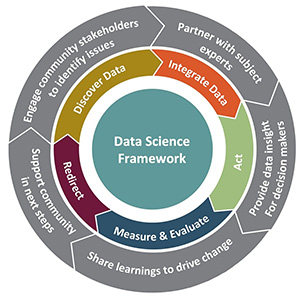By Isabel Alviar
Data is the new science; it has the potential to answer the world’s problems if the right questions are asked. And some data science education programs are now focusing on working with local communities to help with real-world problems.
The Data Science for the Public Good (DSPG) Young Scholars Program is an immersive summer program that engages students from across Iowa to work together on projects that address social issues in the world today. Both graduate and undergraduate students are selected through a competitive statewide search. Graduate students (fellows) lead, support, and guide students together with Iowa State University (ISU) faculty and research associates, while undergraduate students (interns) acquire programming and statistical analysis experience through formal training and practical applications.
Working in teams, fellows and interns collaborate with project stakeholders and research faculty across disciplines. Research teams combine disciplines including statistics, data science, and the social and behavioral sciences to address complex problems proposed by local, state, and nonprofit agencies. Some of the program highlights for scholars include: expert training in tools for quantitative computing and data visualization (R, GIS, Tableau, etc.); professional training through workshops, seminars, and career talks; individualized mentors working closely with students; technical reporting and publication opportunities; and opportunities to interact with decision-makers in local communities, nonprofits, and state government agencies.
This past summer’s DSPG Program ran from May 23 to August 5. In light of COVID-19 and to accommodate non-ISU students, the program was held entirely online. Nonetheless, DSPG Scholars were provided the same opportunities to develop a professional portfolio, expand their networks, and learn about practical applications of data science to solving real-world problems. At the end of the summer, scholars got to present their research at the Annual DSPG Symposium. The symposium featured several distinguished keynote speakers and poster presentations by the Young Scholars. Final presentations for the 2022 DSPG Program were held on Thursday, August 4 via Zoom and recordings are available on ISU’s website.
The program is led every year by five land-grant universities and funded, in part, by the US Department of Agriculture (USDA) National Institute of Food and Agriculture (NIFA) to create a coalition for the public good. Christopher Seeger, one of the professors leading Iowa State’s program, said, “Ultimately, this is a community service. We let the community drive the conversation, while we listen to what they want and how we can help.” All of the projects were built upon a model called the Community Learning through Data Driven Discovery Process (CLD3), and helped local communities tackle real problems. Projects were incredibly diverse, with topics ranging from wholesale local food benchmarking to evaluating indicators for equal local housing needs to creating interactive commodity reports for agricultural marketing.
A webinar that further highlighted some of these projects and the DSPG Program was hosted by the Midwest Big Data Innovation Hub on October 27, 2022. Matthew Voss, Rural Policy Data Analyst for the Public Science Collaborative, featured a project from his summer as a graduate fellow where his team created analytics and dashboards to help a nonprofit organization, Eat Greater Des Moines (EGDM), more effectively target, locate, and expand food rescue in Central Iowa. Their client came to them because they had an abundance of data but did not know how to use it to answer crucial questions posed by their board, such as where people are experiencing the most food insecurity, which distribution sites have the greatest losses due to food waste, etc. This is where the DSPG Scholars stepped in. For their project, the students cleaned the large data sets and then used them to develop sustainable pipelines in Google Sheets and Google Data Studio that visually answered EGDM’s questions through interactive dashboards. The project is now published on the nonprofit organization’s website, where the DSPG team is directly credited for all of their work.
Voss’s project was just one example of how the DSPG Young Scholars Program is making a positive impact on the community while also teaching students valuable data science skills. Two other DSPG fellows, Kelsey Van Selous and Harun Çelik, also presented their projects on the webinar. Dr. Cassandra Dorius, Associate Professor of Human Development and Family Studies, and a founding co-director of the DSPG Program, said, “Students were very creative and motivated, and produced great analytics and projects. We are excited to see how this work improves people’s lives moving forward.”
Get Involved
Contact the MBDH to learn more, or if you’re aware of other people or projects we should profile here. We invite participation in any of our community-led Priority Areas. The MBDH has a variety of ways to get involved with our community and activities.
The Midwest Big Data Innovation Hub is an NSF-funded partnership of the University of Illinois at Urbana-Champaign, Indiana University, Iowa State University, the University of Michigan, the University of Minnesota, and the University of North Dakota, and is focused on developing collaborations in the 12-state Midwest region. Learn more about the national NSF Big Data Hubs community.

